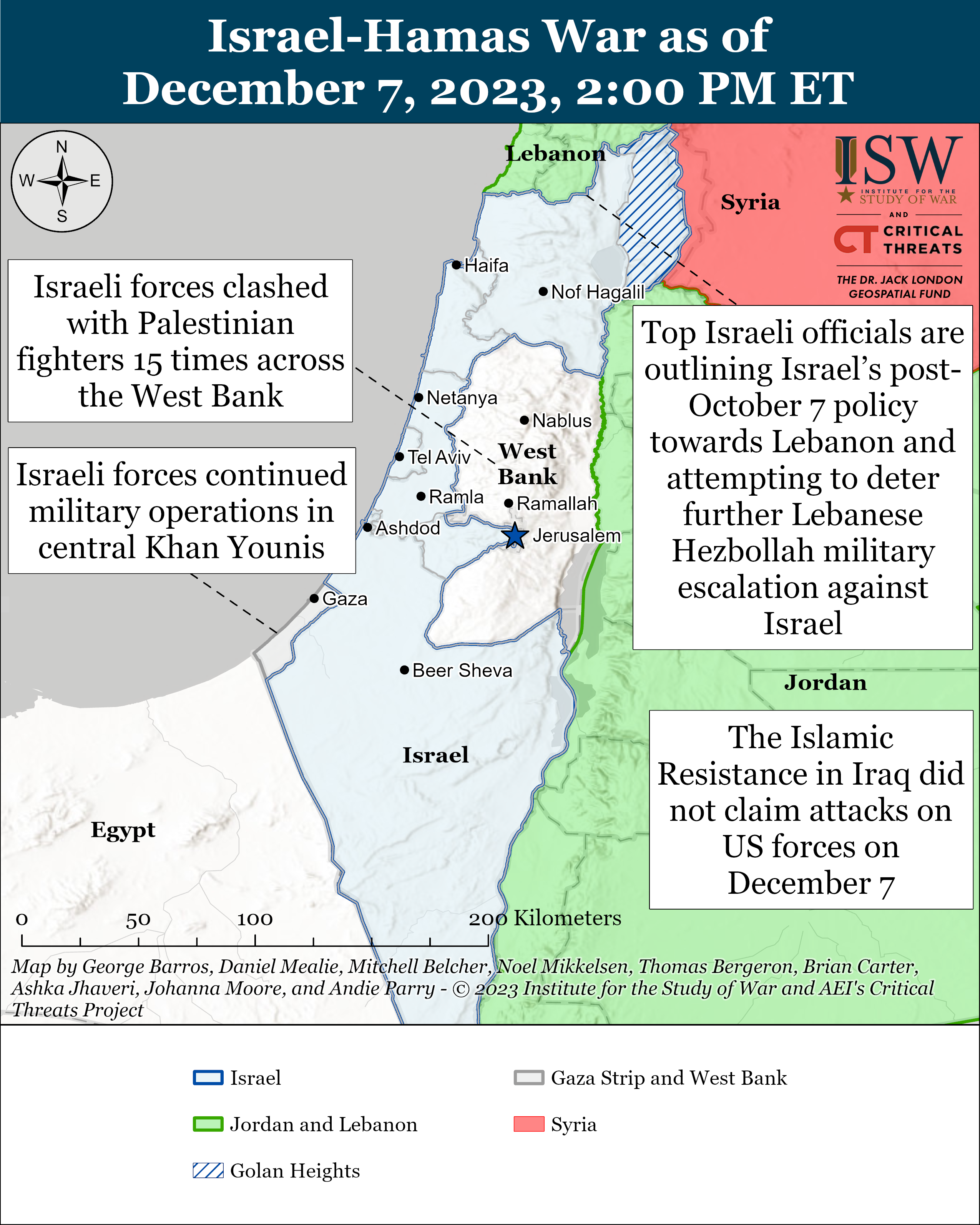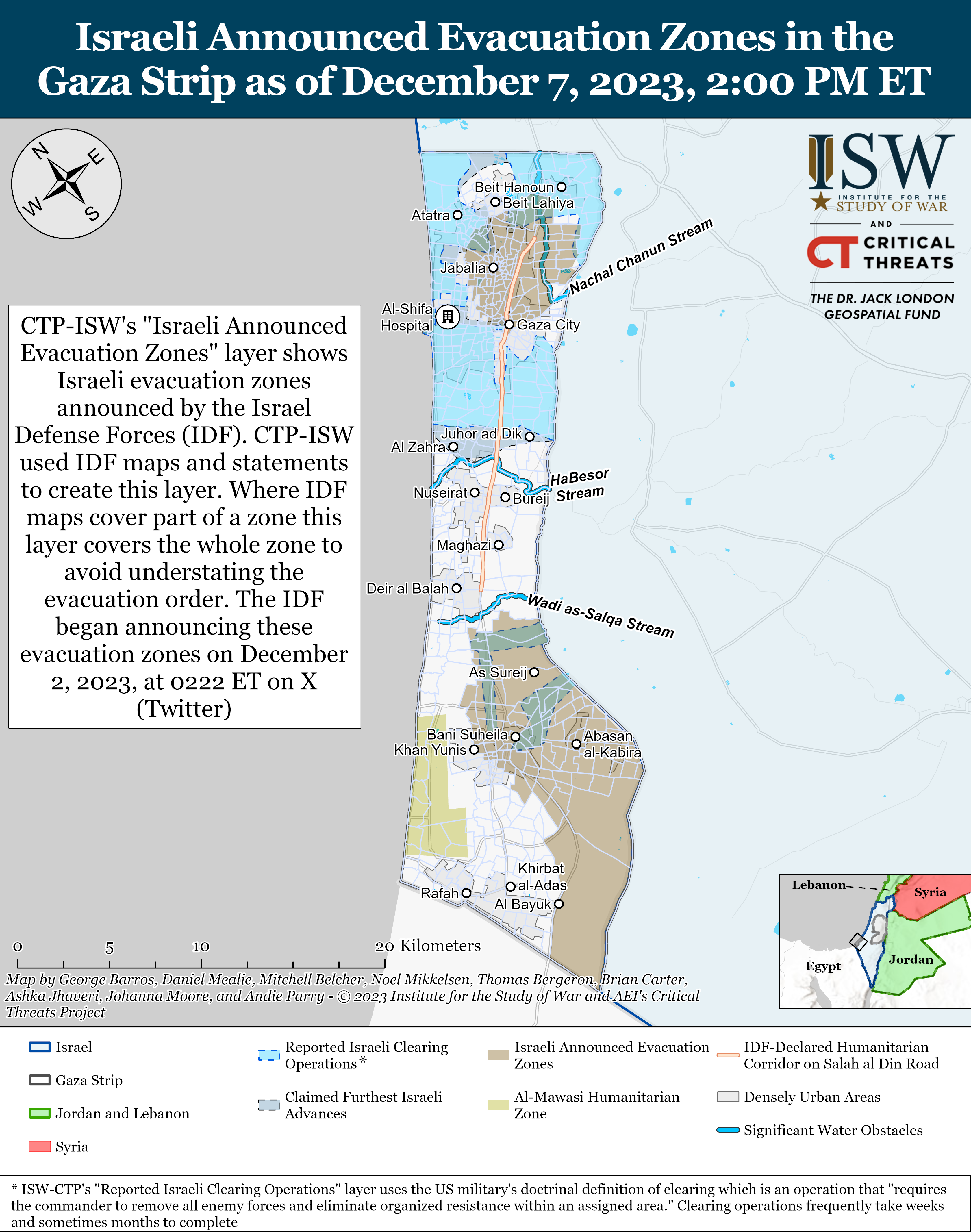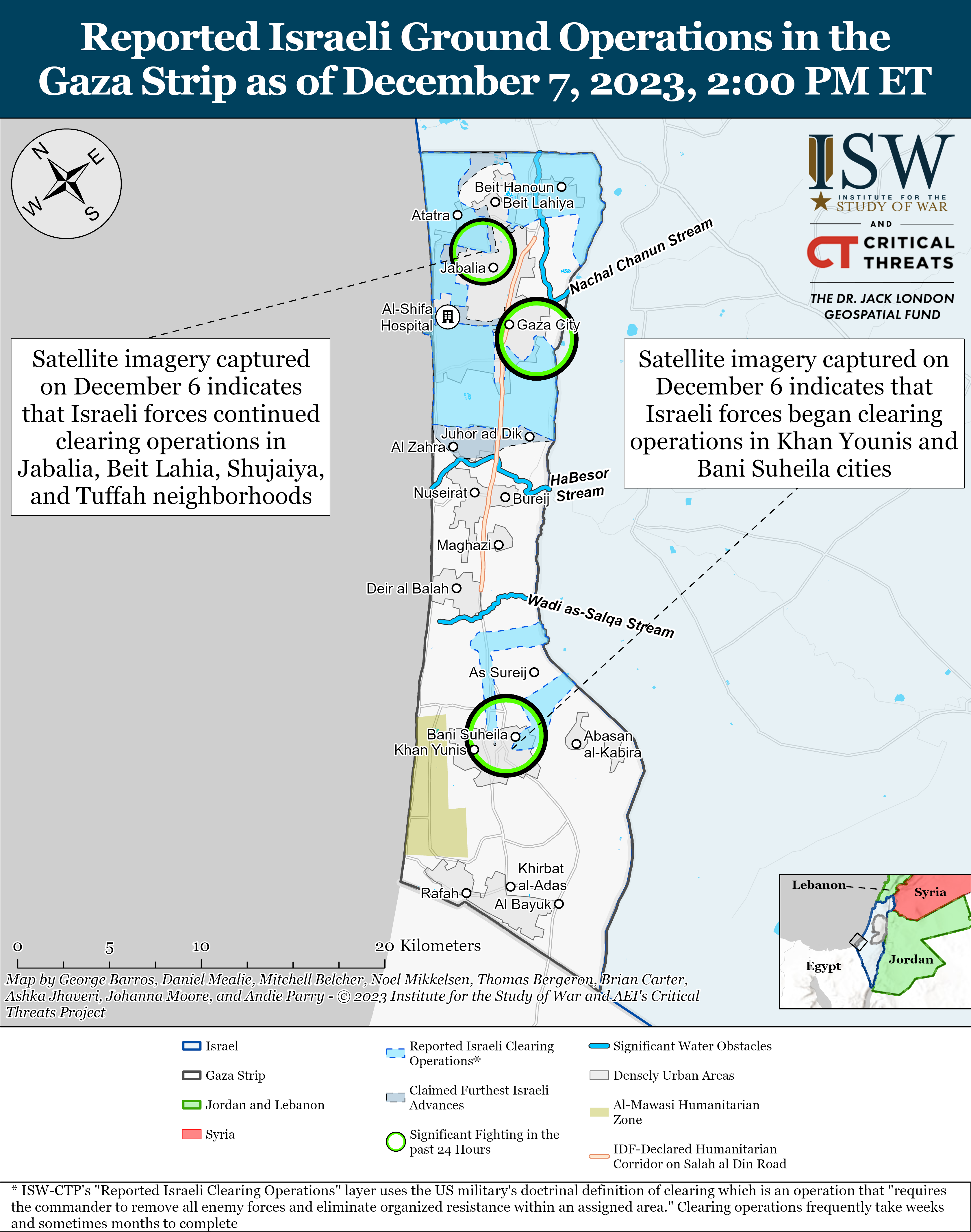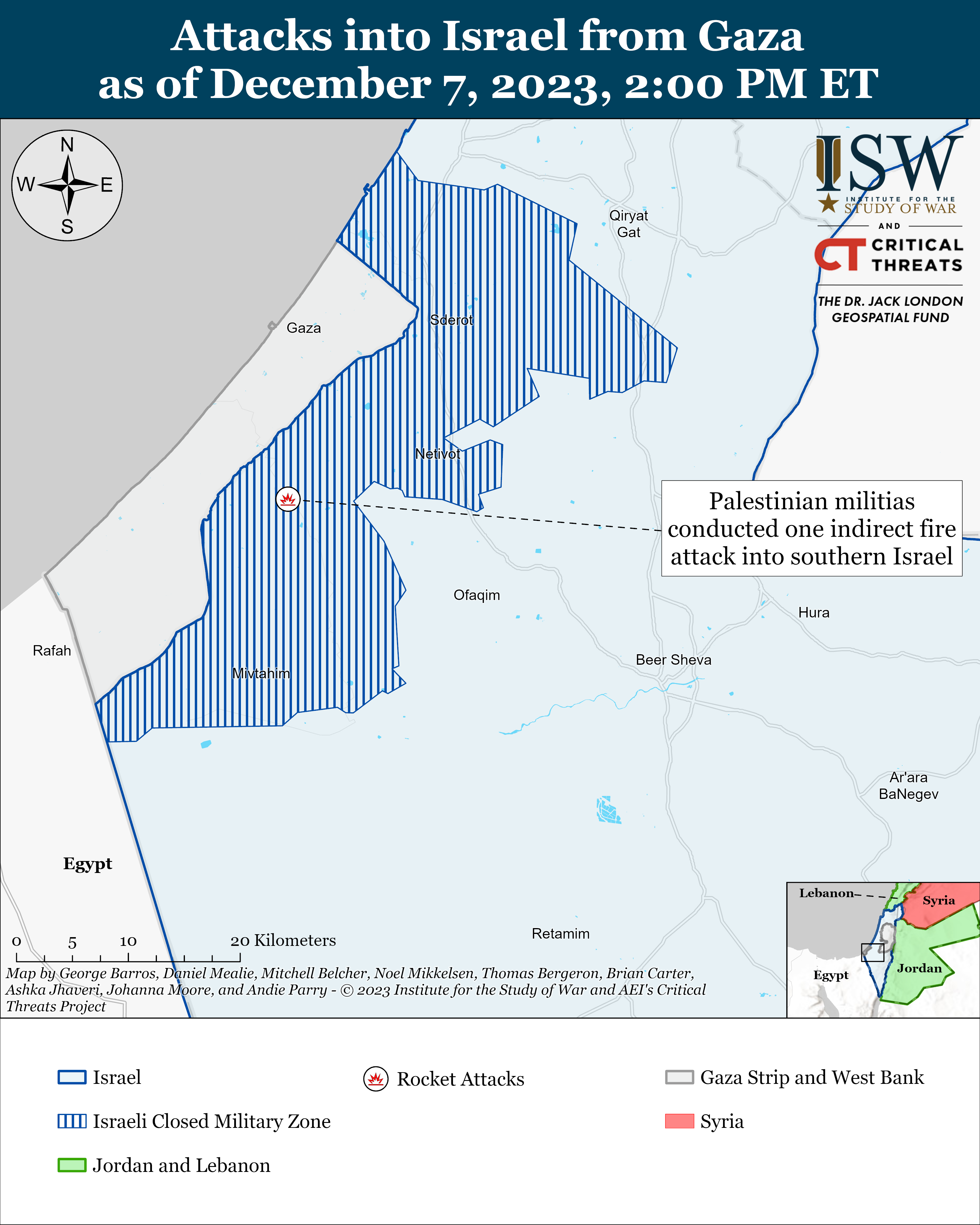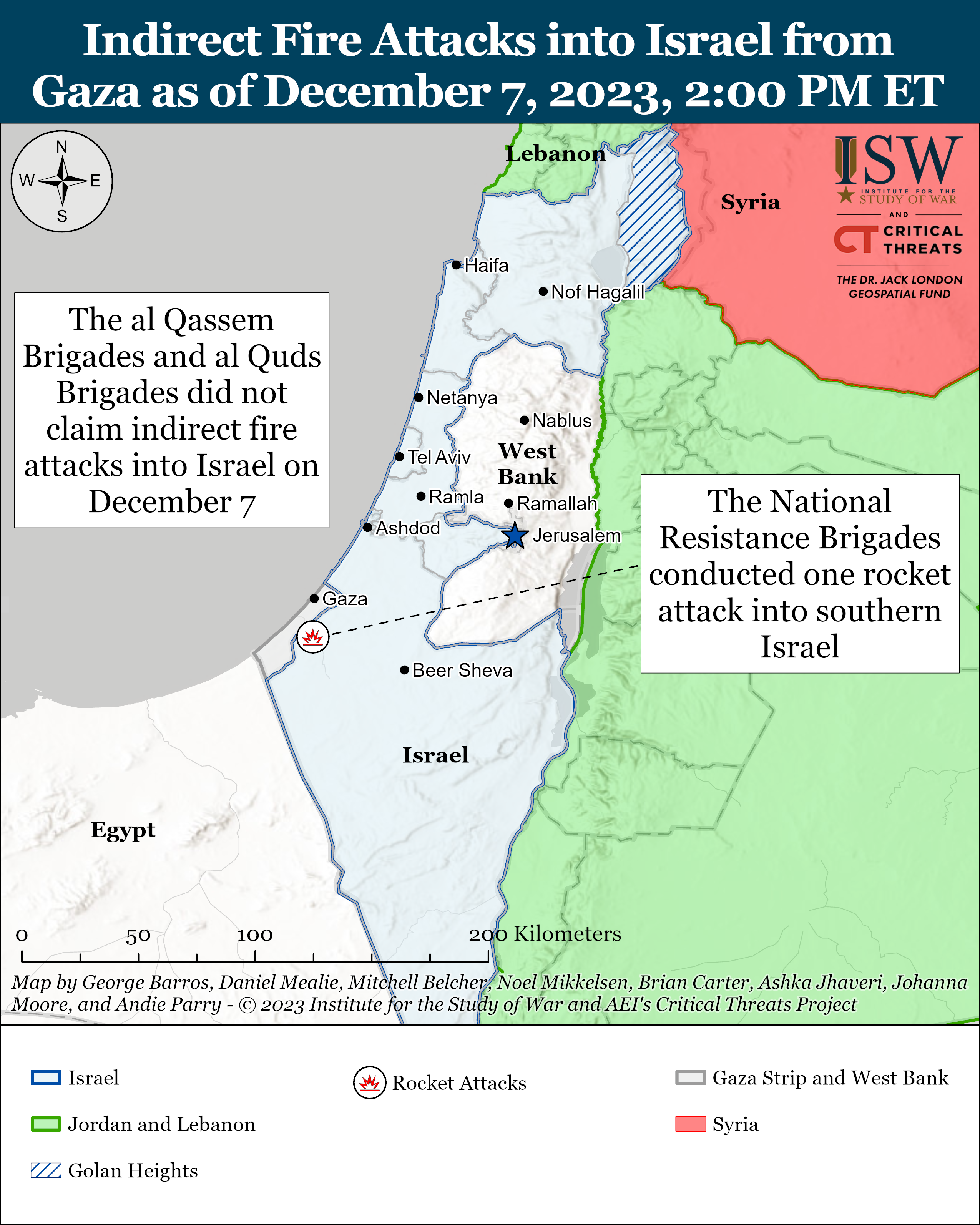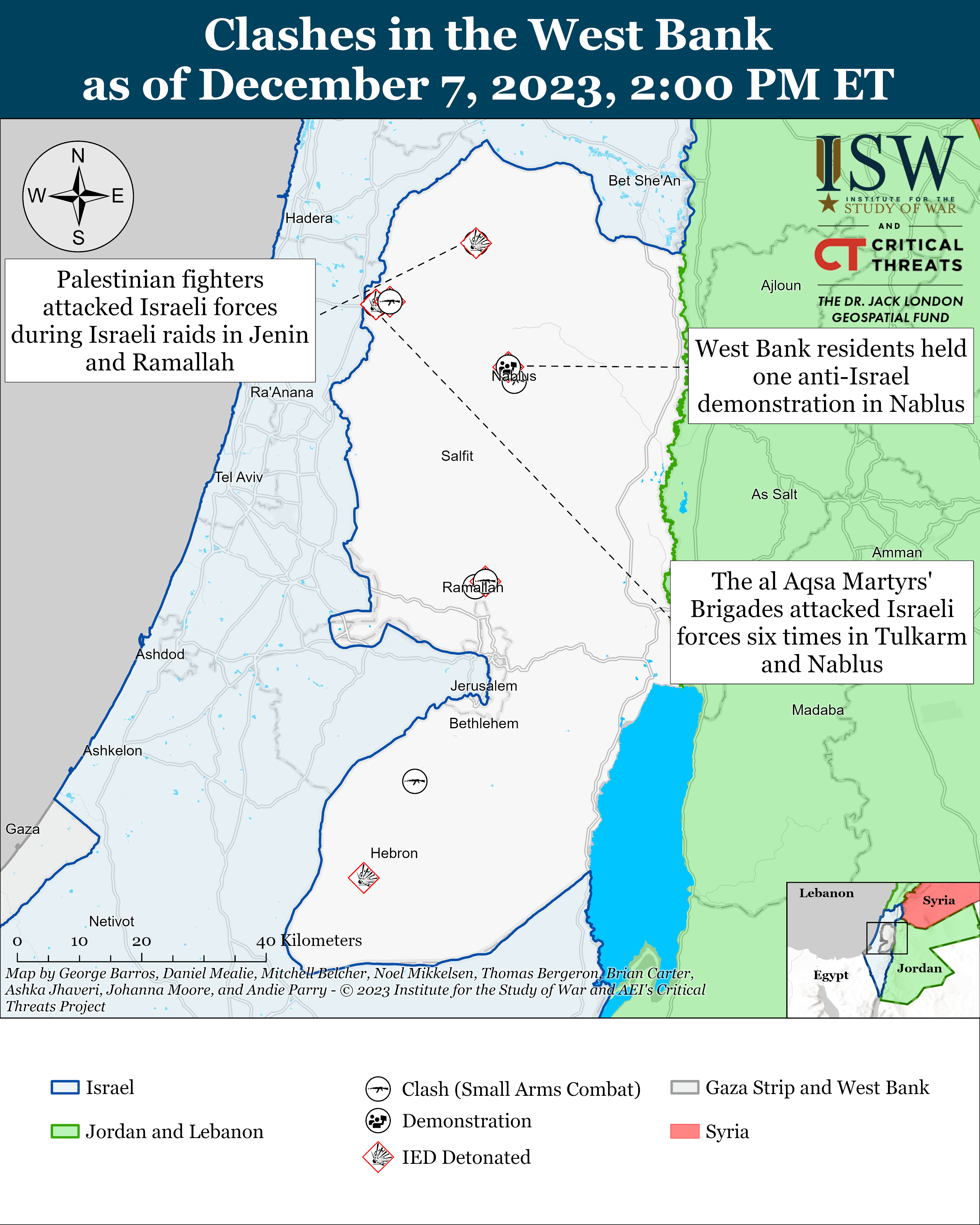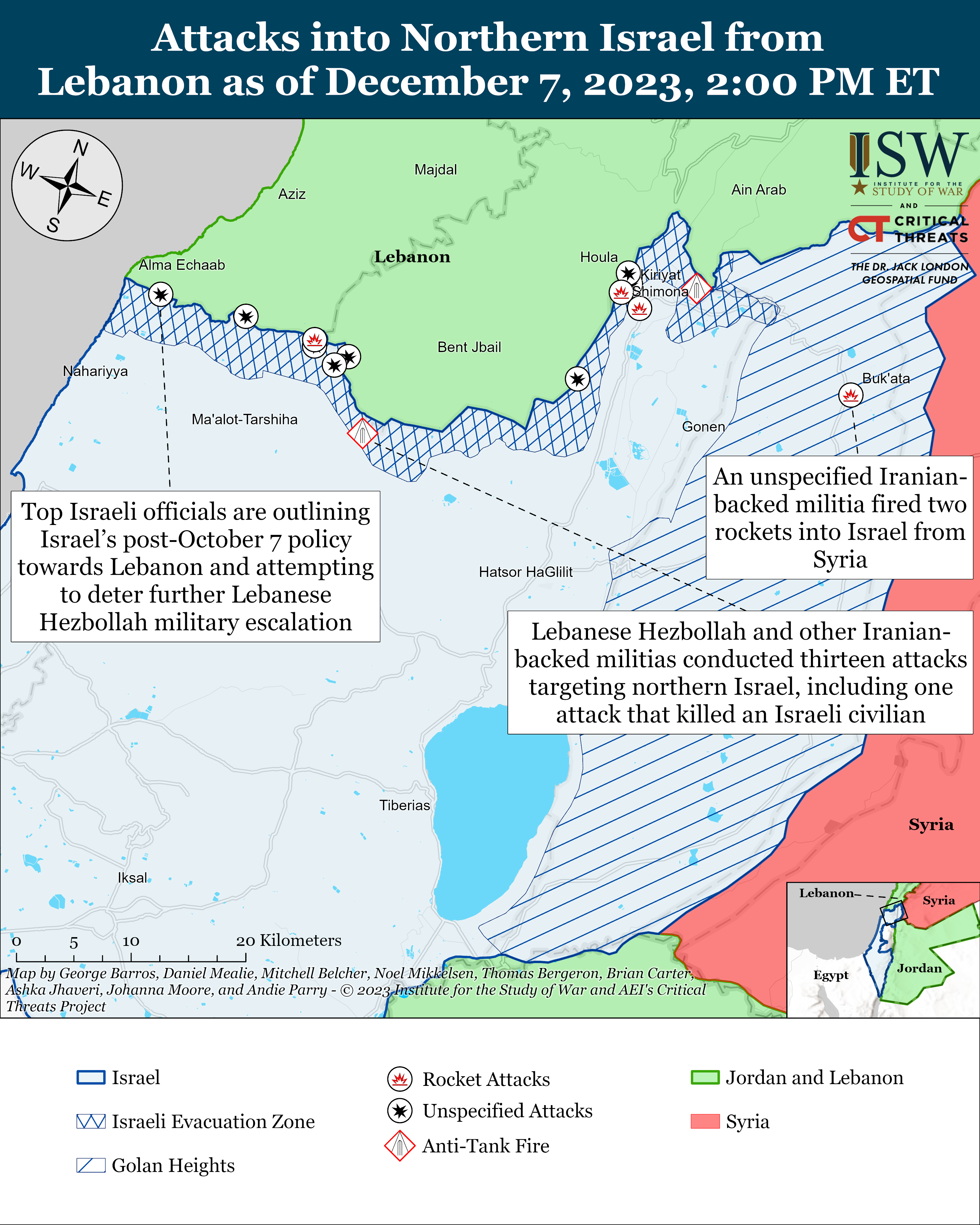Iran Update, December 7, 2023
Annika Ganzeveld, Kathryn Tyson, Andie Parry, Peter Mills, Alexandra Braverman, Brian Carter, and Nicholas Carl
Information Cutoff: 2:00 pm EST
The Iran Update provides insights into Iranian and Iranian-sponsored activities abroad that undermine regional stability and threaten US forces and interests. It also covers events and trends that affect the stability and decision-making of the Iranian regime. The Critical Threats Project (CTP) at the American Enterprise Institute and the Institute for the Study of War (ISW) provides these updates regularly based on regional events. For more on developments in Iran and the region, see our interactive map of Iran and the Middle East.
Note: CTP and ISW have refocused the update to cover the Israel-Hamas war. The new sections address developments in the Gaza Strip, the West Bank, Lebanon, and Syria, as well as noteworthy activity from Iran’s Axis of Resistance. We do not report in detail on war crimes because these activities are well-covered in Western media and do not directly affect the military operations we are assessing and forecasting. We utterly condemn violations of the laws of armed conflict and the Geneva Conventions and crimes against humanity even though we do not describe them in these reports.
Click here to see CTP and ISW’s interactive map of Israeli ground operations. This map is updated daily alongside the static maps present in this report.
Key Takeaways:
- Iranian-backed Iraqi actors are exploiting the Israel-Hamas war to try to expel US forces from Iraq. They are using military, legal, and political pressure to drive out the United States.
- Israeli forces continued clearing and targeting operations in Khan Younis. Palestinian militias claimed at least 18 attacks along the northern and eastern lines of Israeli advance in Khan Younis.
- Israeli forces continued clearing operations in Jabalia. The IDF advanced further into the Shujaiya and Tuffah neighborhoods of eastern Gaza city.
- Palestinian militias conducted one indirect fire attack into southern Israel.
- Israeli forces clashed with Palestinian fighters 15 times across the West Bank.
- Top Israeli officials are outlining Israel’s post-October 7 policy toward Lebanon and attempting to deter further Lebanese Hezbollah military escalation against Israel.
- Lebanese Hezbollah and other Iranian-backed militias conducted thirteen attacks targeting northern Israel, including one attack that killed an Israeli civilian.
- Unspecified Iranian-backed militias fired two rockets from Syria towards Buqata, Israel, in the Golan Heights.
- Harakat Hezbollah al Nujaba political chief Sheikh Ali al Asadi warned the United States to withdraw its forces from the Middle East during an interview with Newsweek.
- Senior Iranian officials met with the International Liaison Department head of the Chinese Communist Party, Liu Jianchao, in Tehran.
- Iranian Foreign Affairs Minister Hossein Amir Abdollahian spoke on the phone with Qatari Prime Minister Mohammad al Thani.
- Russian President Vladimir Putin discussed developing Russian-Iranian economic relations with Iranian President Ebrahim Raisi in Moscow.
Iranian-backed Iraqi actors are exploiting the Israel-Hamas war to try to expel US forces from Iraq. Forcing the removal of the US military is one of Iran’s most important strategic objectives in the Middle East. CTP-ISW previously assessed that the dozens of Iranian-backed militia attacks on US military positions in recent weeks have been meant to impose a cost on the United States for supporting Israel while also eroding American willingness to remain militarily in Iraq and Syria.[1] Iranian and Axis of Resistance leaders are operating on the theory that relatively low levels of militant pressure gradually diminish the willingness of the US political establishment to sustain deployments in the Middle East.
Iranian-backed Iraqi actors are also using legal and political pressure to drive out US forces. The Iraqi Parliamentary Security and Defense Committee announced on December 6 a draft resolution to expel US forces from Iraq in response to US self-defense strikes on Iranian-backed Iraqi militias.[2] A member of the committee framed the strikes as violations of Iraqi territorial integrity and stated that the committee would submit the resolution to the Iraqi parliament speaker.[3] This committee is headed by parliamentarian Abbas Shuail Odeh Thajil al Zamili, who is a member of the Iranian-backed Badr Organization.[4] It is unclear whether Parliament has any legal authority to force the US military to leave Iraq or whether the resolution would be non-binding.
The fact that the committee will submit the resolution to the parliament speaker at this time is particularly noteworthy given recent changes to the position. The Iraqi Federal Supreme Court removed Mohammad al Halbousi from the position on November 14.[5] An Iraqi parliamentarian claimed that Halbousi tried before his ouster to block a parliamentary effort to expel the US ambassador to Iraq, suggesting that Halbousi was removed at least partly for that reason.[6] The expulsion of Halbousi from Parliament may therefore remove an obstacle to advancing anti-US legislation and resolutions. Parliamentarian Mohsen al Mandalawi succeeded Halbousi as the interim parliament speaker. Mandalawi is a member of the Shia Coordination Framework, which is an umbrella organization for Iranian-backed political parties.[7] Mandalawi previously met with Iranian Foreign Affairs Minister Hossein Amir Abdollahian and First Vice President Mohammad Mokhber to discuss the Israel-Hamas war in Tehran on December 4, as CTP-ISW previously reported.[8]
The Iraqi parliament has previously passed non-binding resolutions to expel US forces. The parliament passed a resolution to this end in January 2020, for instance, in response to the US strike that killed Qassem Soleimani and his top Iraqi deputy, Abu Mehdi al Muhandis, at Baghdad International Airport.[9] That resolution was meant to impose political pressure on the prime minister to advance negotiations to remove US forces even though the resolution was non-binding. The resolution called on the Iraqi central government to “revoke its request for [military] assistance from the international coalition.”[10] The 2020 parliamentary resolution argued that US forces should leave because military operations against ISIS were over. The United States later reached an agreement with then-Iraqi Prime Minister Mustafa al Kadhimi in 2021 to end the US combat mission in Iraq and transition the forces there to an advisory mission.[11]
Gaza Strip
Axis of Resistance campaign objectives:
- Erode the will of the Israeli political establishment and public to launch and sustain a major ground operation into the Gaza Strip
- Degrade IDF material and morale around the Gaza Strip.
Israeli forces continued clearing and targeting operations in Khan Younis. The IDF 98th Paratrooper Division destroyed dozens of Hamas tunnel shafts in Khan Younis while conducting clearing operations moving from the north and east.[12] IDF ground forces used drones to identify and call in strikes on Palestinian militants exiting tunnels with RPGs in Khan Younis.[13] Commercially available satellite imagery captured on December 6 shows recently flattened terrain in areas around Khan Younis and Bani Suhaila, where the IDF and Palestinian militias have reported advances and clashes.[14] The satellite footage also indicates that Israeli forces conducted their assault on Khan Younis from two directions—one from the Kissufim road crossing and the other from agricultural land west of Ein HaShlosha.
The IDF Air Force announced on December 7 that it conducted an airstrike targeting two senior Hamas intelligence officials several days beforehand.[15] The airstrike killed a “reconnaissance operative” in Hamas’ al Qarara Battalion and a senior Hamas military intelligence officer responsible for planning the October 7 attack. The strike hit a Hamas intelligence unit that was building a comprehensive assessment of the operational environment in the Gaza Strip, according to the IDF Arabic-language spokesperson.[16] The spokesperson assessed that the destruction of the unit and the operatives’ deaths caused “severe damage to Hamas’ fighting system.“[17]
Palestinian militias claimed at least 18 attacks along the northern and eastern lines of Israeli advance in Khan Younis.[18] The al Qassem Brigades—the militant wing of Hamas—claimed 13 of the direct and indirect fire attacks and used anti-tank rocket propelled grenades (RPG), anti-tank grenades, small arms, and mortars against Israeli forces moving westward and southward.[19] The al Quds Brigades—the militant wing of Palestinian Islamic Jihad (PIJ)—claimed that it mortared Israeli forces in three areas of Khan Younis and Bani Suhaila on December 7.[20] The al Quds Brigades and al Qassem Brigades also conducted two combined mortar attacks on Israeli forces.[21] The Martyr Abu Ali Mustafa Brigades—the militant wing of Popular Front for the Liberation of Palestine (PFLP)—claimed unspecified attacks on Israeli forces on the Israeli eastern line of advance.[22]
Israeli forces continued clearing operations in Jabalia December 7. The IDF 460th Brigade raided an outpost for Hamas’ Central Jabalia Battalion in the al Bisan area of Jabalia on December 7.[23] Israeli forces killed several fighters and located a network of underground tunnels, a training complex, and a weapons warehouse near the Hamas battalion’s post.[24] The IDF said that Palestinian fighters fired anti-tank missiles targeting Nahal Brigade soldiers in Jabalia.[25] Al Qassem Brigades and al Quds Brigades fighters attacked Israeli dismounted infantry, tanks, and armored personnel carriers on their southward line of advance into Jabalia from Beit Lahia.[26] The al Qassem Brigades claimed that its fighters detonated an IED in a tunnel opening after luring Israeli forces into the entrance on the eastward line of advance into Jabalia.[27] The al Qassam Brigades claimed that the attack killed Israeli soldiers.
The IDF advanced further into the Shujaiya and Tuffah neighborhoods of eastern Gaza city. The IDF fought Palestinian militants in a school in eastern Shujauya and located tunnel shafts in the school and weapons warehouses nearby.[28] The commander of the IDF 74th Battalion, which is part of the 188th Armored Brigade, said that the tunnel reaches deep into the Gaza Strip.[29] The IDF uncovered six other tunnel shafts in Shujaiya.[30] Al Qassem Brigades and al Quds Brigades fighters used small arms, mortars, anti-tank grenades, and tandem shells in attempts to stop the advance of Israeli tanks and soldiers.[31] Martyr Abu Ali Mustafa Brigades fighters clashed with Israeli forces in the Shujaiya and Tuffah neighborhoods using unspecified weapons.[32]
The UN continued delivering humanitarian aid to the Gaza Strip on December 7. The UN Office for the Coordination of Humanitarian Affairs (OCHA) announced that eighty trucks carrying humanitarian aid and fuel entered the Gaza Strip.[33] OCHA released a joint statement with other UN and non-governmental organizations calling for increased relief efforts through additional access points, including the Kerem Shalom crossing in southern Israel.[34] An unspecified Israeli official told the Times of Israel that Israel will open the Kerem Shalom crossing for inspections of humanitarian aid trucks.[35] The UN aid chief said on December 7 that the crossing could be opened for humanitarian aid ”soon” but that negotiations are ongoing.[36]
Recorded reports of rocket attacks; CTP-ISW cannot independently verify impact.
Recorded reports of rocket attacks; CTP-ISW cannot independently verify impact.
Palestinian militias conducted one indirect fire attack into southern Israel on December 7. The National Resistance Brigades—the militant wing of the Democratic Front for the Liberation of Palestine—claimed one rocket attack targeting a city near the Gaza Strip.[37] The al Quds Brigades and al Qassem Brigades did not claim indirect fire attacks into Israel on December 7. Palestinian militias previously reduced indirect fire attacks during periods of heavy fighting before the temporary pause began on November 24, as CTP-ISW previously reported.[38]
West Bank
Axis of Resistance campaign objectives:
- Draw IDF assets and resources toward the West Bank and fix them there
Israeli forces clashed with Palestinian fighters 15 times across the West Bank on December 7.[39] This level of violence is consistent with the daily average rate of clashes in the West Bank over the last seven days. The al Aqsa Martyrs’ Brigades clashed with Israeli forces and detonated IEDs targeting these forces six times in Tulkarm and Nablus on December 7.[40] Palestinian fighters separately conducted small arms and IED attacks on Israeli forces during Israeli raids in Ramallah and near Jenin in Araba.[41] Israeli forces arrested 21 wanted individuals, including four Hamas fighters, in the West Bank during overnight raids.[42]
West Bank residents held one anti-Israel demonstration in Nablus on December 7.[43]
This map is not an exhaustive depiction of clashes and demonstrations in the West Bank.
Southern Lebanon and Golan Heights
Axis of Resistance campaign objectives:
- Draw IDF assets and resources toward northern Israel and fix them there
- Set conditions for successive campaigns into northern Israel
Top Israeli officials are outlining Israel’s post-October 7 policy toward Lebanon and attempting to deter further Lebanese Hezbollah (LH) military escalation against Israel. Prime Minister Benjamin Netanyahu issued a statement on December 7 while visiting the IDF Northern Command that aimed to deter LH from escalating against Israel. Netanyahu warned that “if Hezbollah makes a mistake, the IDF will turn Beirut and South Lebanon into Gaza and Khan Younis.”[44] This statement is separate from Israeli Defense Minister Yoav Gallant’s comments on December 6, in which Gallant outlined Israel’s post-October 7 security requirements in southern Lebanon. Gallant said that Israel seeks a diplomatic solution that pushes LH’s military forces north of the Litani River, in accordance with UNSC Resolution 1701.[45] UNSC Resolution 1701 ended the 2006 Israel-Lebanon War.[46] Gallant added that Israel will resort to military force if diplomatic efforts fail.[47]
LH and other Iranian-backed militias conducted thirteen attacks targeting northern Israel on December 7, including one attack that killed an Israeli civilian.[48] LH claimed ten attacks targeting Israeli military positions along the border.[49] The IDF said that an anti-tank guided missile attack killed one Israeli civilian near Mattat, Israel, on December 7.[50] LH claimed that attack.[51]
Unspecified Iranian-backed militias fired two rockets from Syria towards Buqata, Israel, in the Golan Heights.[52] The IDF reported the rockets caused no damage or injuries.[53] IDF artillery targeted unspecified Iranian-backed militia positions in Hadar, Syria, in response to the rocket attack.[54]
Iran and Axis of Resistance
Axis of Resistance campaign objectives:
- Demonstrate the capability and willingness of Iran and the Axis of Resistance to escalate against the United States and Israel on multiple fronts
- Set conditions to fight a regional war on multiple fronts
Harakat Hezbollah al Nujaba (HHN) political chief Sheikh Ali al Asadi warned the United States to withdraw its forces from the Middle East during an interview with Newsweek on December 7.[55] Asadi stated that HHN and the broader Axis of Resistance have created an “escalation schedule” for the Israel-Hamas war and that “there will be surprises that America did not expect from the Axis of Resistance.” Asadi added that the Axis of Resistance is prepared for a long-term battle. HHN is a member of the Islamic Resistance in Iraq—a coalition of Iranian-backed militias that has attacked US forces in Iraq and Syria over 80 times since the beginning of the war.[56] Other HHN officials have previously issued similar warnings and threats to the United States. HHN Secretary General Akram al Kaabi recently threatened on December 4 to retaliate against US forces for an airstrike that killed five Iraqi militants on December 3, for example.[57]
Unspecified gunmen assassinated Iraqi al Dai Party founder Fadel al Marsoumi in Baghdad on December 7.[58] Marsoumi founded the party in 2008, and one of its main objectives is to dissolve “all armed formations outside the framework of the state and the law.”[59] The party also prioritizes establishing an independent judiciary, according to its statements. The al Dai Party launched an election campaign for the upcoming December 18 provincial council elections with the slogan “nationalists offering a referendum.”[60] Iraqi outlets have reported that Marsoumi’s supporters are running in the Diyala provincial council elections under the “Nationalists” electoral list.[61]
Senior Iranian officials met with the International Liaison Department head of the Chinese Communist Party, Liu Jianchao, in Tehran on December 7. Strategic Foreign Relations Council Chairman Kamal Kharazi emphasized in their meeting the importance of cooperation between Iran, China and Russia in forming a “new world order.” Iranian Foreign Affairs Minister Hossein Amir Abdollahian and First Vice President Mohammad Mokhber also attended the meeting, which focused on bilateral cooperation and the Israel-Hamas war. The Iranian and Chinese officials reaffirmed their support for the Palestinian people. Liu stated that China always supports the Palestinian people and stands by Arab and Islamic countries.[62] Mokhber separately stressed Iran’s readiness for increased economic cooperation with China, specifically regarding joint investments in Iran’s oil and gas fields.[63]
Iranian Foreign Affairs Minister Hossein Amir Abdollahian spoke on the phone with Qatari Prime Minister Mohammad al Thani on December 7. The two discussed bilateral relations and the Israel-Hamas war, according to Iranian readouts.[64]
Russian President Vladimir Putin discussed developing Russian-Iranian economic relations with Iranian President Ebrahim Raisi in Moscow on December 7. Putin stated that trade between Russia and Iran grew by 20 percent in 2023 and reached over five billion dollars.[65] Putin reported that Russia and Iran are constructing a railway line along an unspecified section of the North-South Corridor (a planned railway route that will connect Russia to the Indian Ocean via Iran).[66] Putin also announced that he and Raisi intend to sign an agreement establishing a free trade zone between Iran and the Eurasian Economic Union (EAEU) at the end of December 2023.[67] The continued progress on the North-South Corridor and the planned establishment of an EAEU-Iranian free trade zone are likely part of continued Russian efforts to procure Iranian materiel support for Russian operations in Ukraine while facilitating both Russian and Iranian sanctions evasion efforts. Putin also noted the ”importance [for him and Raisi] to exchange views on the situation in the region, especially in Palestine” and commended Iranian-Russian energy and education cooperation.[68] Putin met with Omani Crown Prince and Minister of Culture, Sports, and Youth Theyazin bin Haitham bin Tariq Al Said on December 7 on the sidelines of the “Russia Calling!” investment forum in Moscow, likely a continuation of bilateral meetings with Persian Gulf State leaders after Putin’s December 6 meetings in the United Arab Emirates and Saudi Arabia.[69]
[2] https://almaalomah dot me/news/49308/politics/%D8%A3%D8%A8%D8%B1%D8%B2-%D9%81%D9%82%D8%B1%D8%A7%D8%AA%D9%87-%D8%B7%D8%B1%D8%AF-%D8%A7%D9%84%D9%82%D9%88%D8%A7%D8%AA-%D8%A7%D9%84%D8%A3%D9%85%D8%B1%D9%8A%D9%83%D9%8A%D8%A9-%D9%85%D8%B4%D8%B1%D9%88%D8%B9-%D9%87%D8%A7%D9%85-%D8%B9%D9%84%D9%89-%D8%B7%D8%A7%D9%88%D9%84%D8%A9-%D8%A7%D9%84%D8%AF%D9%81%D8%A7%D8%B9
[3] https://almaalomah dot me/news/49308/politics/%D8%A3%D8%A8%D8%B1%D8%B2-%D9%81%D9%82%D8%B1%D8%A7%D8%AA%D9%87-%D8%B7%D8%B1%D8%AF-%D8%A7%D9%84%D9%82%D9%88%D8%A7%D8%AA-%D8%A7%D9%84%D8%A3%D9%85%D8%B1%D9%8A%D9%83%D9%8A%D8%A9-%D9%85%D8%B4%D8%B1%D9%88%D8%B9-%D9%87%D8%A7%D9%85-%D8%B9%D9%84%D9%89-%D8%B7%D8%A7%D9%88%D9%84%D8%A9-%D8%A7%D9%84%D8%AF%D9%81%D8%A7%D8%B9
[6] https://shafaq dot com/ar/%D8%B3%DB%8C%D8%A7%D8%B3%D8%A9/%D9%85%D9%81%D8%A7%D8%AC-%D8%A9-%D8%A8%D8%B1%D9%84%D9%85%D8%A7%D9%86%D9%8A-%D8%A7%D9%84%D8%AD%D9%84%D8%A8%D9%88%D8%B3%D9%8A-%D8%B1%D9%81%D8%B6-%D8%B9%D9%82%D8%AF-%D8%AC%D9%84%D8%B3%D8%A9-%D8%A7%D8%B3%D8%AA%D8%AB%D9%86%D8%A7-%D9%8A%D8%A9-%D9%84%D8%B7%D8%B1%D8%AF-%D8%A7%D9%84%D8%B3%D9%81%D9%8A%D8%B1%D8%A9-%D8%A7%D9%84-%D9%85%D8%B1%D9%8A%D9%83%D9%8A%D8%A9
[35] https://www dot timesofisrael dot com/liveblog_entry/israel-to-open-kerem-shalom-crossing-for-gaza-aid-inspections-for-first-time-since-war-started/
[47] https://timesofisrael dot come/liveblog_entry/gallant-well-push-hezbollah-beyond-litani-river-before-residents-of-northern-israel-return-home/
[57] https://www.shafaq dot com/ar/%D8%A3%D9%85%D9%80%D9%86/%D8%A7%D9%84%D9%86%D8%AC%D8%A8%D8%A7-%D8%AA%D8%AA%D9%88%D8%B9%D8%AF-%D8%A7%D9%84%D9%82%D9%88%D8%A7%D8%AA-%D8%A7%D9%84-%D9%85%D8%B1%D9%8A%D9%83%D9%8A%D8%A9-%D8%A8%D9%80-%D8%A7%D9%84%D8%AB-%D8%B1-%D9%84%D8%B6%D8%AD%D8%A7%D9%8A%D8%A7-%D8%A7%D9%84%D9%82%D8%B5%D9%81
[61] https://mangish dot net/%D8%AA%D9%81%D8%A7%D8%B5%D9%8A%D9%84-%D8%AC%D8%AF%D9%8A%D8%AF%D8%A9-%D8%B9%D9%86-%D8%A7%D8%BA%D8%AA%D9%8A%D8%A7%D9%84-%D8%B1%D8%AC%D9%84-%D8%A7%D9%84%D8%AF%D9%8A%D9%86-%D8%A8%D8%A8%D8%BA%D8%AF%D8%A7/


